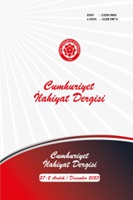Bedir Savaşı Özelinde Dırâr b. el-Hattâb ve Ka'b b. Mâlik'in Nakîza Türü Şiir Atışmaları
Ḍirār b. al-Khaṭṭāb and Kaʿb b. Mālik's Naḳīḍa Type Poetry Competitions in the Battle of Badr
Author(s): Mehmet YılmazSubject(s): History of Islam, Theory of Literature, Sociology of Religion, History of Religion, Rhetoric, Sociology of Literature
Published by: Cumhuriyet Üniversitesi İlahyat Fakültesi
Keywords: Arabic Language and Rhetoric; Naḳīḍa; the Era of the Prophet; Ḍirār b. al-Khaṭṭāb; Ka'b b. Mālik; Battle of Badr;
Summary/Abstract: The subject of this study is the naḳīḍa (opposing) type of poetry competitions between the Meccan poet Ḍirār b. al-Khaṭṭāb (d. 12/633) and the Muslim poet Kaʿb b. Mālik (d. 50/670) from Medina during the Battle of Badr, when the Muslims and the polytheists confronted for the first time. The problem is the questioning of the approaches reflected in the naḳīḍa poems, which were used as a means of propaganda and psychological superiority by the Muslims and polytheists during the Battle of Badr. Naḳīḍa poems, the subject of the study, are important for getting to know the two opposite understandings closely and forming an opinion about the naḳīḍa poems sung during the era of the Prophet Muhammad. Although there are some recent studies on naḳīḍa poems from the era of the Prophet, these studies lacked details and only mentioned general features. The interesting approaches and fine details reflected in the verses, such as Ḍirār b. al-Khaṭṭāb's claims aiming to distract attention and discredit the Muslims of Medina in the face of the unexpected defeat of the Meccan army at Badr that the Battle of Badr was a tribal war between the Meccans and the Medinans, makes this study prominent. On the other hand, Kaʿb b. Mālik's verses reflect the approaches bearing traces of the Islamic faith and draw attention to the fact that the battle was between faith and unbelief and the Muslims of Medina were proud of their support for the Messenger of Allah. Undoubtedly, Meccan immigrants participated in the Battle of Badr along with the Muslims of Medina. Even so, Kaʿb b. Mālik does not mention Muhājirs (immigrants) in his verses. This suggests that Kaʿb b. Mālik may have concentrated on responding to the allegations made by Ḍirār b. al-Khaṭṭāb. Document analysis, one of the qualitative method techniques, was used in the study. First, a literature review was conducted to better understand the subject, and the studies related to the field were briefly mentioned. Then, summary information about the concept and background of naḳīḍa is provided. Two call-and-response poems between the Jāhiliyyah period poet Imruʾ al-Qays (d. 545) and ʿAbīd b. al-Abraṣ (d. 555) are included as an example for the first phases of naḳīḍa poems. Then, brief information about the Meccan poet Ḍirār b. al-Khaṭṭāb and the Medinan poet Kaʿb b. Mālik are presented. After the background information, two naḳīḍa poems of both poets were examined and analyzed, and the differences in the Battle of Badr were pointed out. Concepts that are common in the eulogies of the Jāhiliyyah period, such as nobility, being a master warrior, and generosity, draw attention in Ḍirār b. al-Khaṭṭāb's verses. On the other hand, in his verses Ka'b b. Mālik uses terms and expressions brought by Islam such as the Messenger of Allah, there is no Lord but Allah, unbelievers, Hell, and hellfire. In the verses of both poets, there are clues about the commonly used battle orders and war equipment of the period. The opinions are summarised in the conclusion part of the study.
Journal: Cumhuriyet İlahiyat Dergisi
- Issue Year: 27/2023
- Issue No: 2
- Page Range: 640-660
- Page Count: 21
- Language: Turkish

